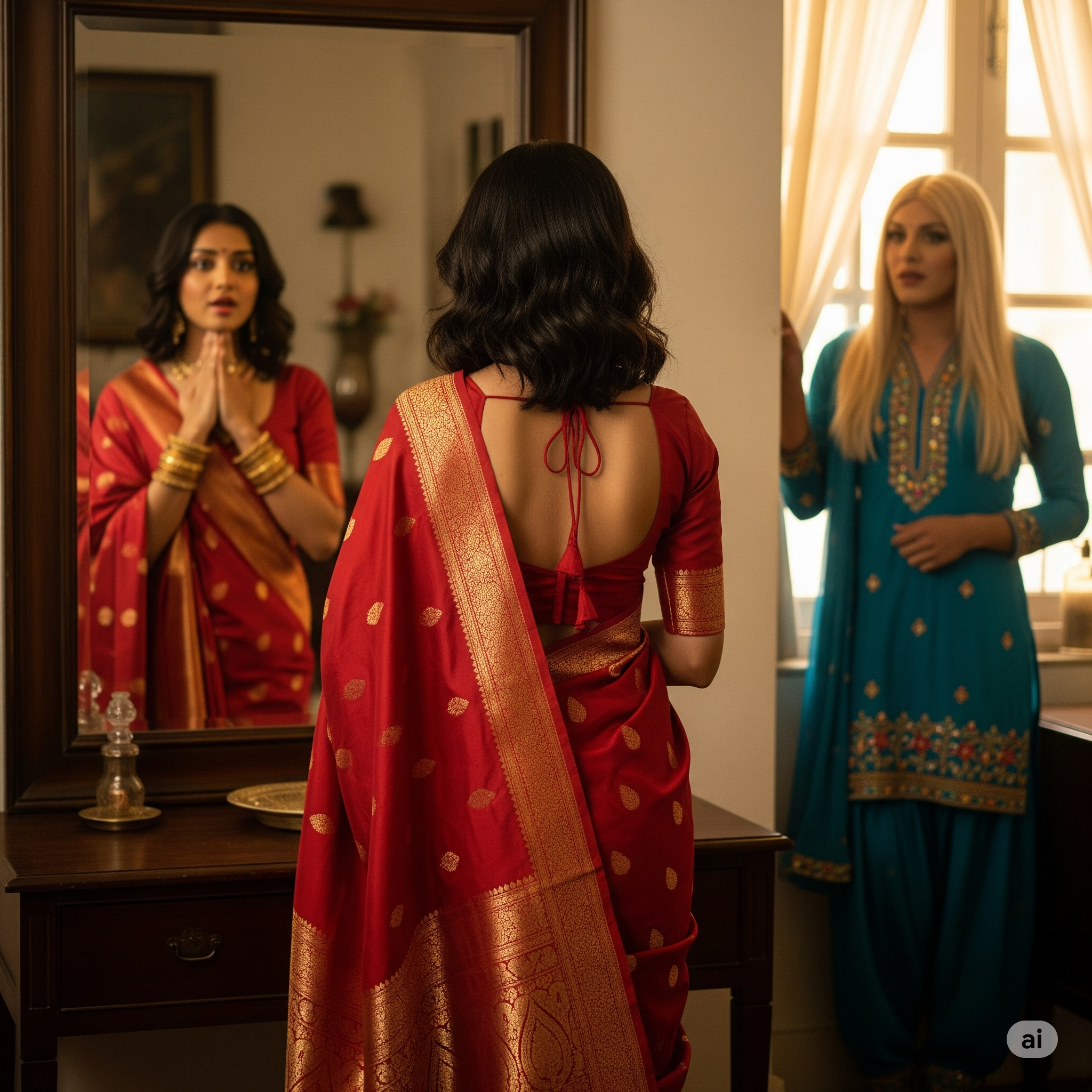Chapter 1 – The Procedure
Rohan Mehta was used to being precise.
As a second-year PhD student in mechanical engineering at MIT, precision was survival. His mornings were mechanical: 6:15 wake-up, 7-minute shower, protein smoothie, two tabs of modafinil if he was behind on lab work. On that particular Monday, he deviated from routine just once—he added brave underwear to his duffel bag. His mother had mailed them from Pune: loose cotton boxers and a white cotton kurta. “For good luck before surgery,” she’d written, “and dignity afterward.”
Rohan was getting a hernia repaired. That was all.
He’d developed the small bulge in his lower abdomen during his second semester while helping a labmate shift a broken robotic arm prototype. He had meant to ignore it. Pain was familiar. But eventually it started hurting while walking, then when sitting, and finally even while lying down. He could no longer ignore it without risking strangulation or rupture.
The surgery was scheduled for 7:30 a.m. at Boston General Hospital, a large, bustling urban medical center that prided itself on its reputation for cutting-edge surgery and inclusive care. Rohan had chosen it because it was covered by his university insurance, not because of its transgender surgery unit—a detail he barely noted when checking in online.

He arrived alone at 6:45, dressed in joggers, hoodie, and glasses. The front desk attendant smiled. “You’re early, Mr. Mehta.”
“Graduate students are always early,” he replied, dryly.
She handed him a clipboard and wristband. “Procedure confirmation: inguinal hernia repair, left side. Dr. Carlson’s team. You’ll be called soon.”
He signed quickly, distracted by his buzzing phone. His advisor was texting about a grant application. His mother had sent a temple emoji. He responded with a thumbs-up and the folded hands.
When the nurse finally led him to pre-op, he lay down on the gurney, folded his hoodie under his head, and closed his eyes.
Somewhere, someone printed the wrong label.
Rohan Mehta’s identity got switched with another patient—Rowena Matthison, a transgender woman undergoing gender confirmation surgery.
No alarms rang. His gender marker on file was “M,” but Rowena’s had recently been updated to “F.” Due to a recent software migration, both had identical initials and similar birth years. A single dropdown misclick finalized the catastrophe.
Inside the sterile, chilled operating room, the anesthesiologist said, “She’s under.”
The lead surgeon adjusted his gloves. “Begin with the orchiectomy, then the vaginoplasty. We’ll start the tracheal shave once the lower team is underway.”
“FFS is on the list too—chin, brow, and jaw contouring,” a nurse confirmed.
Not one of them knew that the man on the table had only come in for a minor repair.
The lights dimmed over Rohan’s unconscious form.
The future was being rewritten—without his permission.
Chapter 2 – The Awakening
Pain came in waves. But it wasn’t localized to the left lower groin like he expected.
It pulsed across his pelvis. Radiated up his spine. His chest felt heavy, bound. There was a strange pressure between his legs. Something foreign. Something wrong.
A nurse’s voice filtered in through the fog: “Vitals are stable. She’s waking up.”
She?
Rohan blinked slowly. The ceiling above was unfamiliar. Harsh lights. Monitors beeping. A tube still down his throat. He gagged.
Another voice, this one firmer. “Easy. You’ve been under for eight hours.”
Eight hours? A hernia repair shouldn’t have taken more than ninety minutes.
The tube was withdrawn. He coughed, lips dry. “W-what happened?” he rasped.
A nurse looked at her tablet, expression tight. “We’ll call your surgeon.”
Moments passed. Then a man in scrubs entered, followed by another in a suit and tie.
“Mr. Mehta,” the suited man began, “I’m—”
Rohan’s scream cut through the room.
He had lifted the sheet.
Bandaged groin. But not the expected incision. Something deeper. Something cut, removed.
He ripped the gown away. Two tight, high-set dressings where his chest should be. A sharp, stinging sensation in his throat. His hands flew to his jaw. It felt different. Narrower.
“What. Did. You. Do?”
Dr. Carlson stepped forward. “There has been… an error. A critical one. The hospital performed gender-affirming surgery on you by mistake. I am… I’m so sorry.”
Rohan stared at him. “You mean you… castrated me?”
Silence.
“You cut off my penis? You implanted breasts?!”
“Please, Mr. Mehta—”
“I CAME IN FOR A HERNIA!”
Chapter 3 – The Fallout
Three days passed. Rohan refused visitors. He barely ate. He barely moved.
Lawyers from the hospital’s risk management team came daily, offering statements, settlements, apologies. A representative from the Massachusetts Board of Medicine asked him to sign a gag order. He refused.
“I want names,” he said.
The hospital had already suspended three surgical staff members. The mistake had been traced to a software migration error, compounded by human failure at multiple checkpoints. In the pre-op theater, no one had verified his identity verbally. They had prepped the “SRS patient.” The notes, bloodwork, even his ethnicity had not triggered alarms.
“I’m a man,” he repeated to the administrator. “You made me… not.”
But the medical team had already begun estrogen therapy post-op to prevent inflammation and infection. His testosterone had dropped to near zero. The shape of his face, the healing wounds—none of it could be reversed easily.

The endocrinologist assigned to his case, Dr. Myles, was direct.
“Medically speaking, your body has been structurally altered. You’re infertile. A full phalloplasty could take years, and it would not restore original function or sensation. If we cease hormones now, you may develop severe hormonal imbalance.”
Rohan swallowed hard. “So I have to… continue with estrogen?”
“For now. To heal.”
He laughed bitterly. “I’m healing from the trauma you gave me by… becoming a woman?”
Dr. Myles didn’t answer.
Chapter 4 – Chemical Pathways
The effects of estrogen began slowly. At first, it was nausea and migraines. Then came the mood shifts—sudden bursts of crying, anxiety, disorientation.
By week four, his skin had begun softening. Body hair growth slowed. His face, still bruised from surgery, looked slightly less angular.
Therapy became mandatory, both for liability and for stabilization. He was referred to Dr. Connors, a trauma-informed gender therapist.
The first session was silence.
The second, rage.
The third, something else.
“I feel like I’m decaying,” Rohan admitted, staring at the carpet. “Like everything I built is falling apart. I can’t even use the bathroom without… seeing it.”
Dr. Connors nodded. “Grief is a fair response.”
“I didn’t ask for this,” he said. “But I can’t un-become it.”
“Exactly. Which means we have to find the version of you that can live in this body, or it’ll destroy you.”
Rohan swallowed. “Who the hell is that person?”
“She may have a name. We just don’t know it yet.”
Chapter 5 – The Name
The nightmares returned regularly.
He was back in the operating room. His voice muted. Strapped to the table. Surgeons mistaking him for someone else. Each dream ended with him screaming into a mirror that didn’t recognize him.
He stopped shaving. Stopped wearing pants. Stopped trying to make his voice deeper.
Some part of him gave up.
Or gave in.
One night, while staring at a Reddit thread of Hindu goddesses, he found a myth that held him in place. Rhea—ancient mother of the gods. Forced to birth and watch her children be consumed. Until she rebelled, and saved one child, and birthed the next world.
He whispered it aloud.
Rhea.
Not Rohan. Not anymore.
Rhea Mehta.
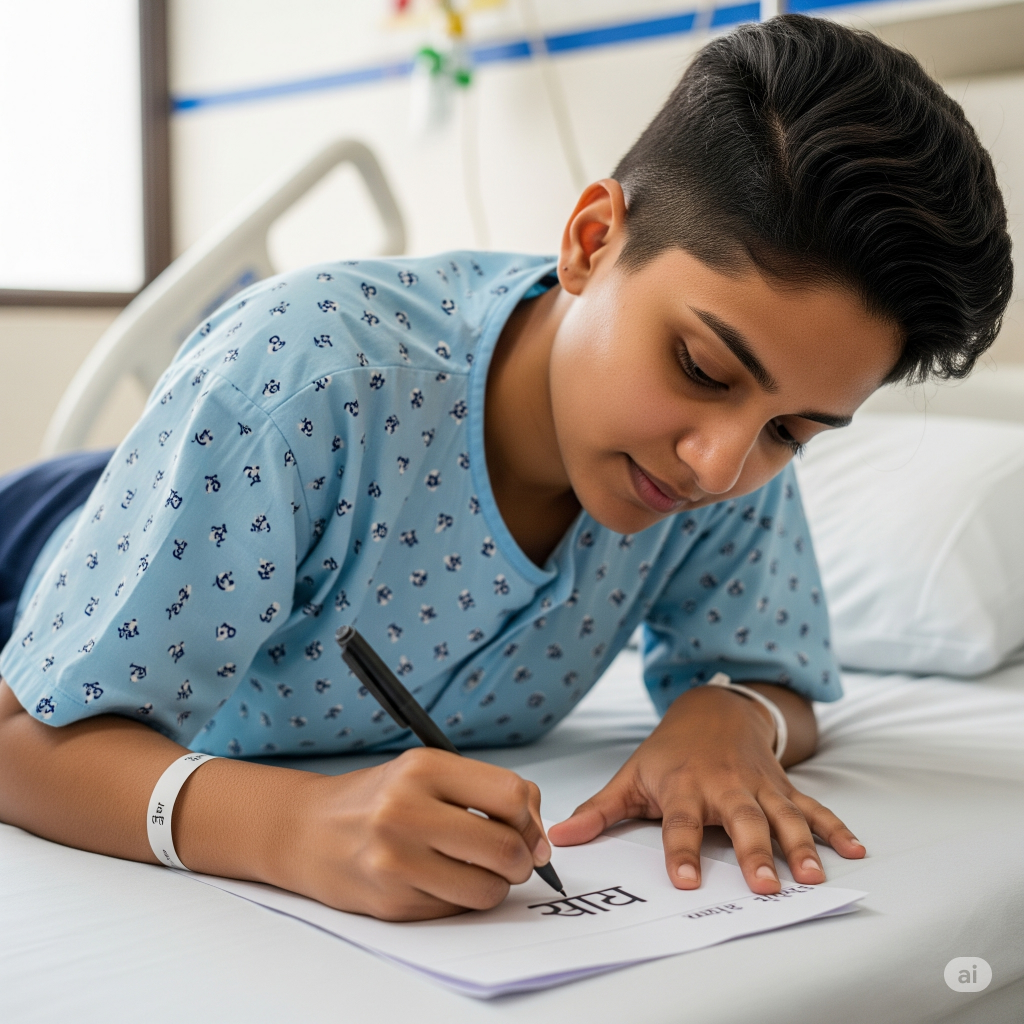
She sat with the word for a long time before writing it in her journal. Then over and over, like a child learning the alphabet again. A feminine signature in English, and then in Devanagari.
And then she cried—for hours, for Rohan, for the boy she used to be. For the body she had loved once and now couldn’t recognize.
And when she slept, she dreamed not of scalpels but of silk. Of red bangles. Of a voice—not hers—singing lullabies.
Chapter 6 – Encounter with Rowena
The first message came in a DM.
“I think we need to talk. I’m Rowena. The surgery was meant for me.”
Rhea stared at the screen for twenty minutes before replying.
I know who you are.
They met at a dimly lit café in Cambridge, where no one would recognize either of them. Rhea wore a hoodie and jeans, her long hair tied back. Rowena arrived in a floral dress and flat sandals, her presence somehow both gentle and commanding. She looked, Rhea thought, like someone who had learned to live with contradiction.
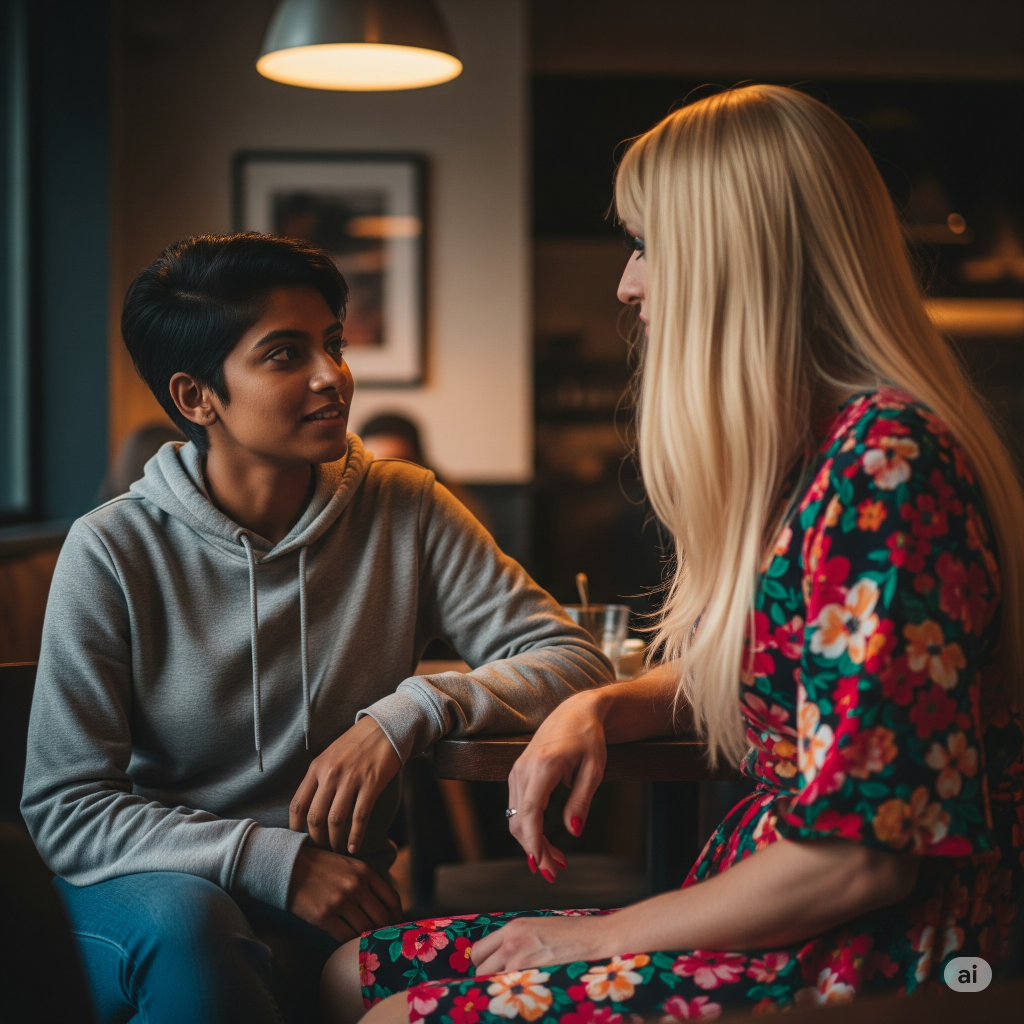
For a few minutes, neither of them spoke.
“I waited three years for that surgery,” Rowena said finally, her voice soft. “And then… it happened to you.”
Rhea nodded. “I’m sorry.”
“You didn’t do anything wrong.”
“I still feel like I stole something from you.”
Rowena looked at her carefully. “And what did they steal from you, Rhea?”
The name caught her off guard. She hadn’t said it aloud in public yet. Hadn’t claimed it.
“I don’t know who I am,” she admitted.
“Neither did I for most of my life.”
Rowena reached across the table, slowly. “Can I… just hold your hand?”
Rhea hesitated, then placed hers atop Rowena’s. Slim fingers touched. Something shifted—not romance, not yet—but an unbearable gentleness. A beginning.
Chapter 7 – The Mirror and the Flame
Rhea began spending more time with Rowena. They talked about pain and politics, hormones and haircare, trauma and girlhood and everything in between. Sometimes they cried. Sometimes they laughed until it hurt.
One night, Rowena brought a makeup bag.
“I want to show you something,” she said.
Rhea sat reluctantly at her desk mirror. Rowena worked in silence—foundation, contour, soft kajal, a touch of gloss. She didn’t make it dramatic. She made it Rhea.
“Okay,” Rowena said finally. “Look.”
Rhea turned to the mirror—and froze.
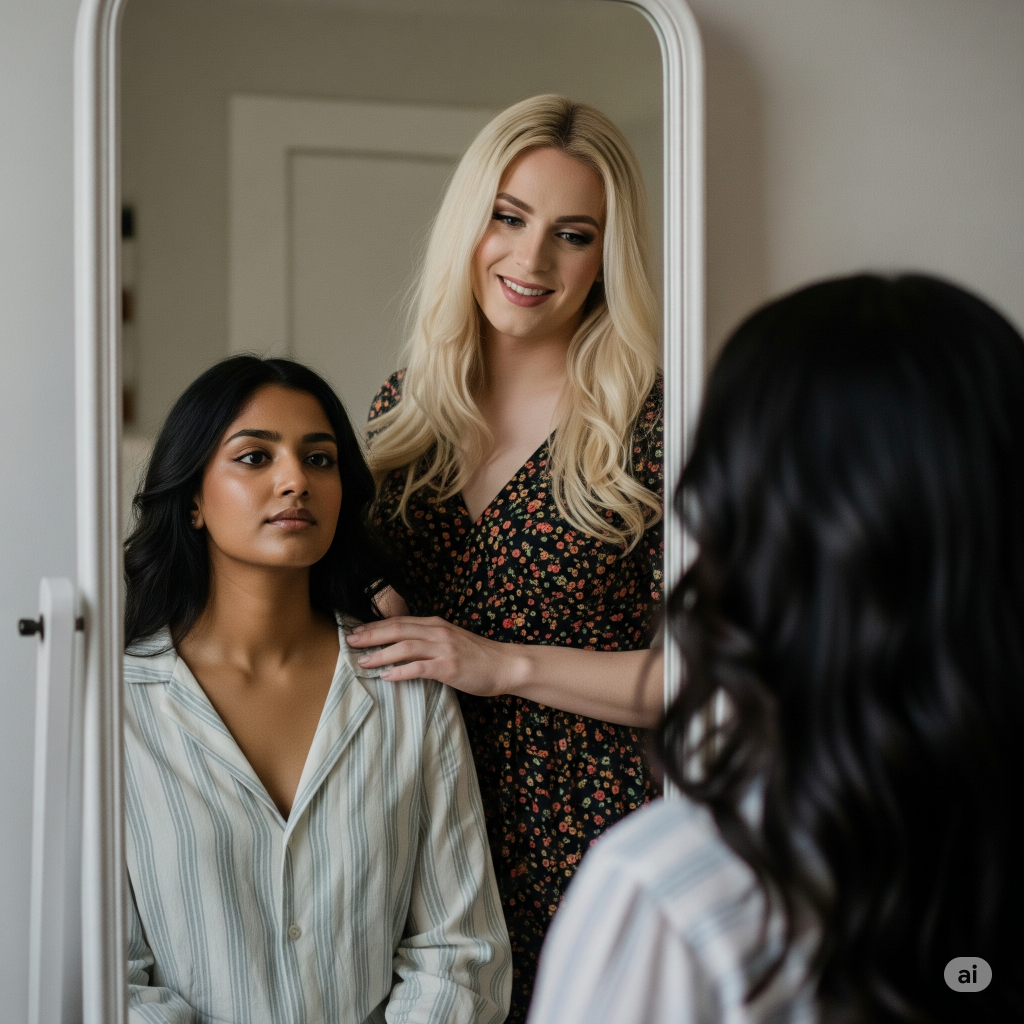
Her face had always felt like a battleground. Something in transition. But this? This was someone new. Someone soft. Feminine. Real.
She didn’t cry. Not yet.
But when Rowena touched her cheek, she leaned into it.
They didn’t kiss. Not that night.
But Rhea fell asleep on the couch with her head in Rowena’s lap, listening to her hum an old tune Rhea hadn’t heard since childhood.
Chapter 8 – The Saree
The invitation came from Boston Desi Pride: a South Asian queer gathering, with food, poetry, music, and sarees for those who wanted to wear one.
Rhea panicked.
“I’ve never worn one. Not even as a joke. Amma would’ve lost her mind.”
Rowena smiled. “Let her lose it. You’ll gain something better.”
They picked out a dark teal Kanjeevaram from a boutique in Somerville. Rhea’s hands trembled as she held the blouse. It was tight, feminine, open-backed. The silk of the saree felt like sin and salvation.
Rowena draped it on her slowly, pleating, folding, tucking. Her hands lingered on Rhea’s waist just a second too long.
When Rhea looked in the mirror, fully dressed, bangles jingling on her wrists, her mouth parted in awe.
“I look…”
“You look gorgeous,” Rowena whispered. “Like a woman who survived fire.”
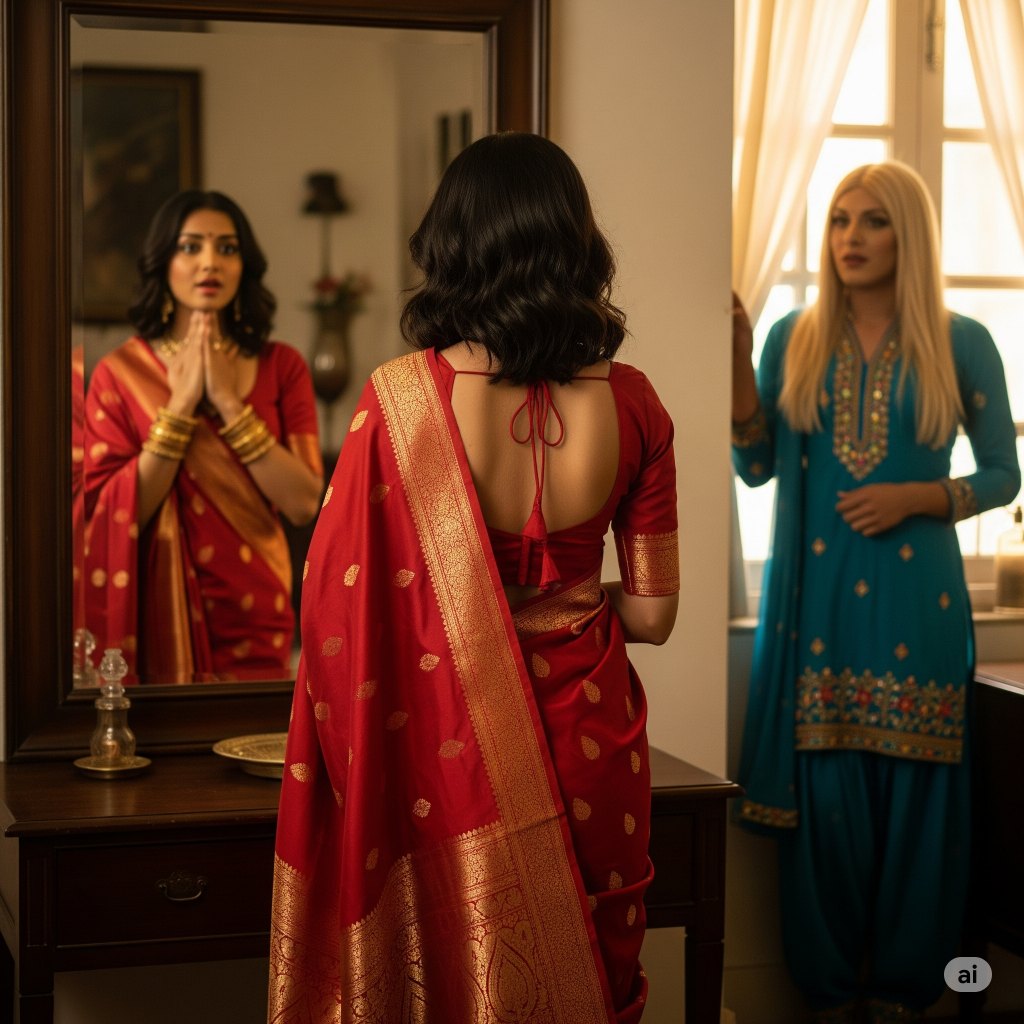
That night, walking into the pride gathering, she held Rowena’s hand. People smiled at her—not with confusion, but recognition.
She laughed with strangers. She danced barefoot. She leaned against Rowena under the fairy lights and whispered, “This is the first time I’ve felt beautiful.”
Rowena kissed her temple. “That’s because you are.”
Chapter 9 – The Piercings
Two weeks later, Rhea stood outside an old Indian goldsmith’s shop in Jackson Heights, Queens. Her palms were sweating.
“This is silly,” she said. “It’s just ears and a nose. Not a big deal.”
Rowena squeezed her hand. “It’s a huge deal.”
Inside, the goldsmith was an older Tamil woman who barely blinked when Rhea gave her name. She held up three options: tiny diamonds, gold hoops, and delicate rubies.
“Diamond,” Rhea whispered. “Just like my paati.”
The pain was brief. A single tear ran down her cheek when the studs were in place. But not from pain. From memory. From claiming something.
Her reflection, this time, didn’t look foreign.
It looked exactly like who she had always been becoming.

Rowena wrapped her arms around her waist from behind and murmured, “You’re glowing.”
Rhea whispered, “I feel… like I finally belong to myself.”
Chapter 10 – Amma
Rhea rehearsed the words for weeks.
Amma, something happened. It wasn’t my choice, but it changed everything. I need you to see me.
She had kept her transition secret for nearly ten months. The surgeries, the hormone therapy, the legal settlement—it was all behind layers of silence. Her mother had only known Rohan was recovering from “a serious surgical error.” The specifics had been left vague. Now, the time had come.
They video-called late at night. Amma sat at her small puja room in Pune, wearing her cotton sari and gold-rimmed glasses. A flickering diya lit her lined face.
Rhea wore a simple kurti. Her hair in a braid. Studs in her ears. A single diamond in her nose.
“I need to show you something, Amma,” she said quietly. “Please don’t hang up.”
Amma narrowed her eyes.
And then Rhea said it.
“I am your daughter now.”
A long pause. Then came the gasp.
“What nonsense is this?”
“I didn’t choose this,” Rhea said. “The hospital made a mistake. They thought I was someone else. And they… they changed my body.”
“You mean to say…” Her voice cracked. “They made you a woman?”
“Yes.”
Silence.
“Do you want to be one now?”
“I didn’t… at first. But now, Amma, I’m learning how to be whole again.”
The screen froze for a second. Then the wail began.
“Ayyo Bhagavan… what curse is this? What have I done in my past life to see this shame? Are you wearing earrings like a girl? A nose ring?”
“Amma—”
“You’ll never be married. Never have children. What will I tell the neighbors? Your father is turning in his grave.”
Rhea’s voice broke. “Appa wouldn’t want me dead.”
Her mother’s face hardened. “You are already dead.”
The screen went dark.
Chapter 11 – Letters to Appa
In the days that followed, Rhea couldn’t stop shaking.
Rowena stayed close but didn’t press. She made her tea. Rubbed her back. Held her at night when the tremors woke her.
Rhea began to write.
Dear Appa,
They changed my body. And maybe my soul, too. But I’m still your child.
She wrote every day. Letters she’d never send. Letters she burned one by one at the fireplace, a ritual for grief, for survival.
She remembered Appa’s hands—rough, gentle. The time he’d taught her to braid her sister’s doll’s hair, “so you never hurt a real girl’s scalp.”
She imagined what he might say now.
My son… my daughter…
No. Just: My Rhea.
She wrote that name fifty times in a letter, and finally, her hands stopped shaking.
Chapter 12 – Rowena’s Transition Interrupted
Rowena’s surgery had been rescheduled for spring. But as her date approached, she hesitated.
One night, curled beside Rhea under thick blankets, she whispered, “I’m not sure I want to go through with it.”
Rhea blinked. “You don’t want SRS anymore?”
“I used to. Before I met you.”
Rhea didn’t speak.
“I thought I needed surgery to be real. But now… I don’t know. I love how I feel with you. In this body. In this moment.”
“You’d stay like this… for me?”
“No,” Rowena said, softly. “I’m staying like this because I realized being a woman isn’t about anatomy. It’s about presence. And I’ve never felt more present than when I’m with you.”
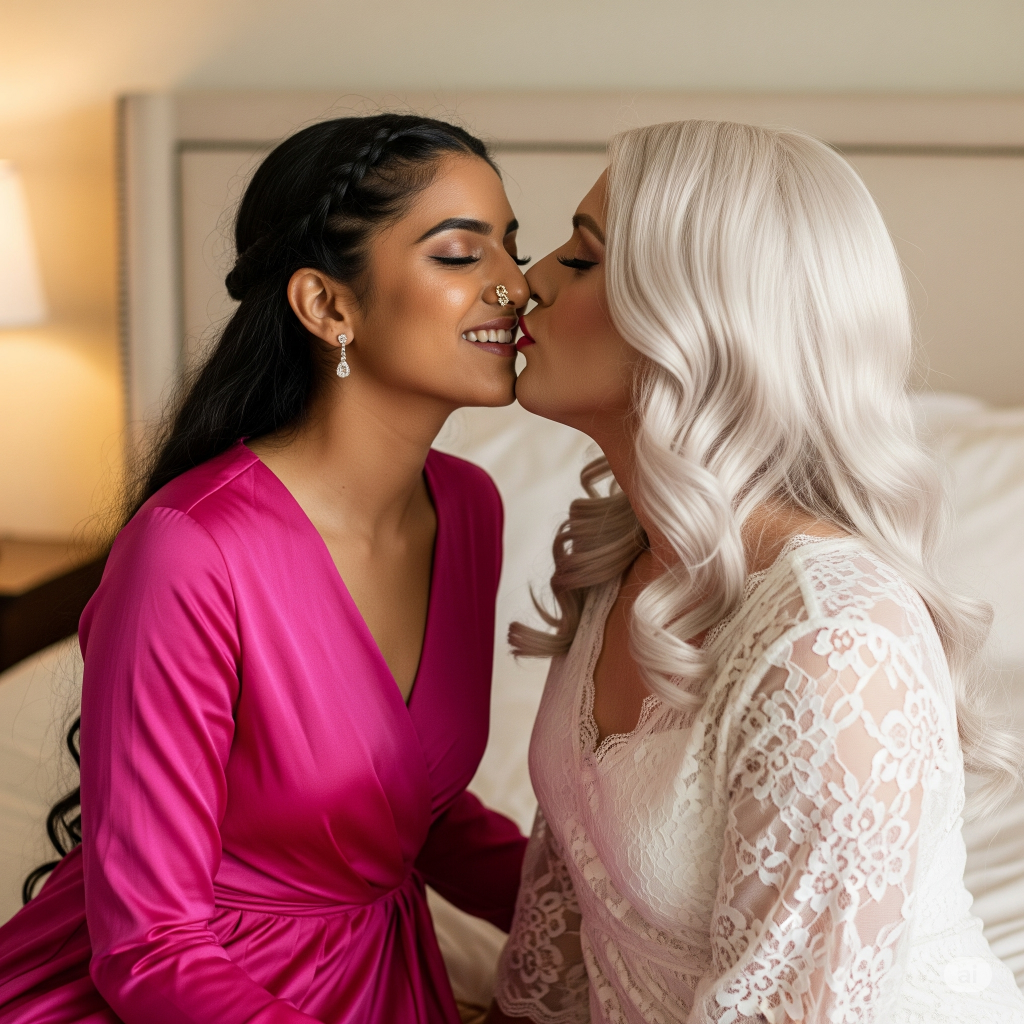
They made love that night slowly, reverently. Exploring, learning, unlearning. Two women, not defined by parts, but by how they touched. How they spoke. How they wept in each other’s arms after.
Chapter 13 – Amma’s Journey
The knock at the apartment door was unexpected.
It was morning. Rhea, in an oversized tee and leggings, opened it—and nearly dropped her mug.
Amma stood there.
Sari tightly pinned. Hair oiled and braided. A small suitcase at her feet.
“I thought… if I die without seeing you, I’ll burn in hell twice.”
She stepped in without being asked.
The next few days were tense. Amma didn’t speak much. She avoided looking directly at Rhea. She flinched at Rowena’s presence.
But she watched.
She watched Rhea cook her dal without help. She watched Rhea thread jasmine into her own braid. She watched her daughter cry silently after a nightmare, and Rowena gently hold her.
One evening, Amma pulled out a small box.
Inside were jhumkas. Heavy, traditional South Indian earrings.
“These were mine when I got married,” Amma said. “I was saving them… for my daughter.”
Rhea gasped.
“I only have one daughter now,” Amma said quietly. “And she wears hers in America.”
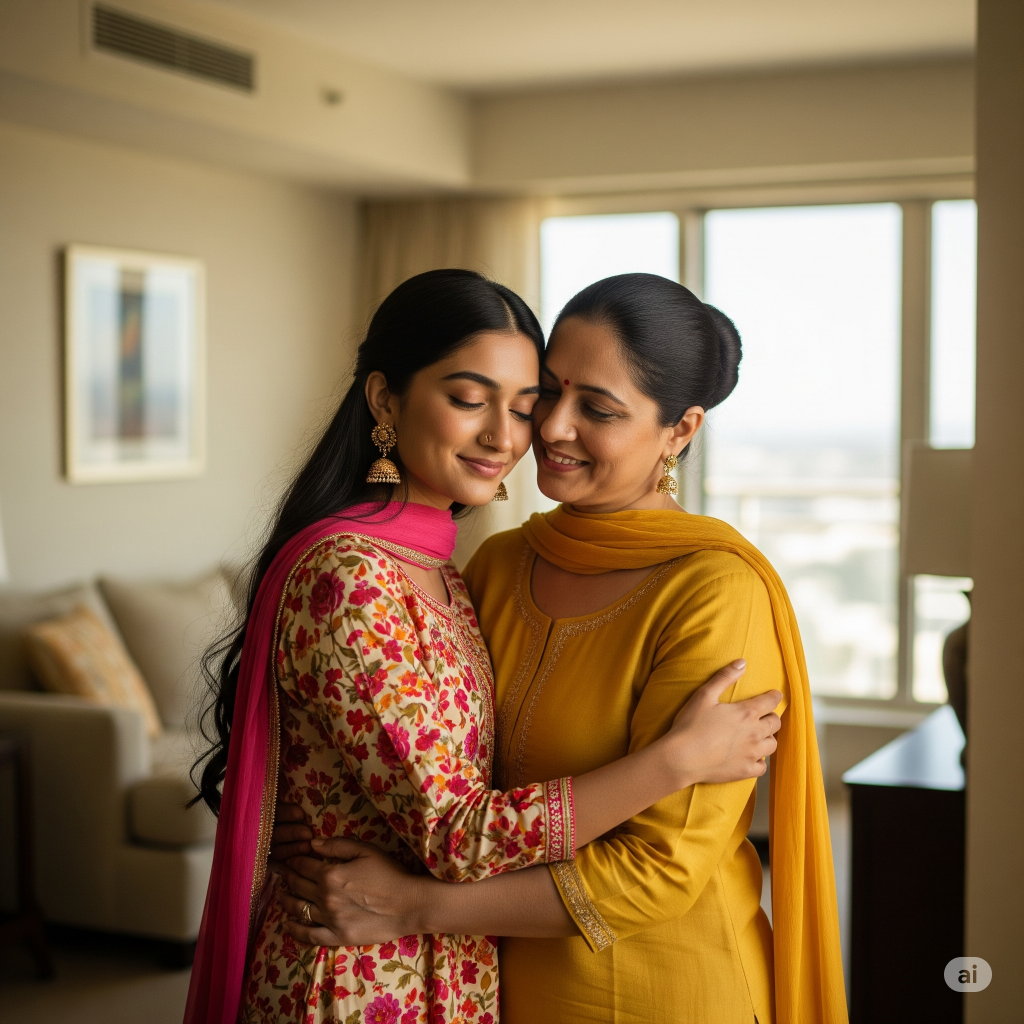
They embraced. No more words. Just salt and silk and years between them finally collapsing.’
Chapter 14 – The Blessing
Amma rose at dawn on the final day of her visit. She washed, prayed, and prepared a small puja in the apartment’s living room. She placed turmeric and kumkum on a silver plate. Lit incense. Chanted softly.
Then she called them both forward.
Rowena in a peach salwar. Rhea in a pale yellow saree.
Amma tied a red thread around Rhea’s wrist, then Rowena’s.
“You are my daughters now,” she said.
She blessed them with rice and ghee and tears.
The threads itched slightly, but neither woman touched them.
They were sacred.
They were proof.
That love, too, could be rewritten—and sanctified.
Chapter 15 – Mehendi and Mangalsutra
The wedding was not grand.
There were no marble halls or designer lehengas. Just a rooftop garden in Jamaica Plain, rows of folding chairs, hand-painted lanterns from a Bangladeshi auntie’s store, and a playlist of Bollywood songs both women had grown up with.
Rhea’s saree was crimson silk, woven in Pune and mailed by her mother. Gold zari stitched the borders. Her blouse was tight, embroidered with tiny mango leaves, exposing her back and her scars, which she no longer hid.
Rowena wore a pastel lehenga. No veil. Her long brown hair curled over one shoulder. They had decided early on—no heels. Just barefoot blessings.
Amma applied Rhea’s haldi the night before. The turmeric paste cooled her cheeks and tingled across her brow bone. She wore Amma’s jhumkas, and this time, she didn’t flinch when they swung gently against her neck.
As the mehendi was applied, Rowena watched the patterns trace up Rhea’s arms with reverent eyes.
“You’re going to make a beautiful bride,” she said.
“You already made me one,” Rhea replied, smiling shyly.
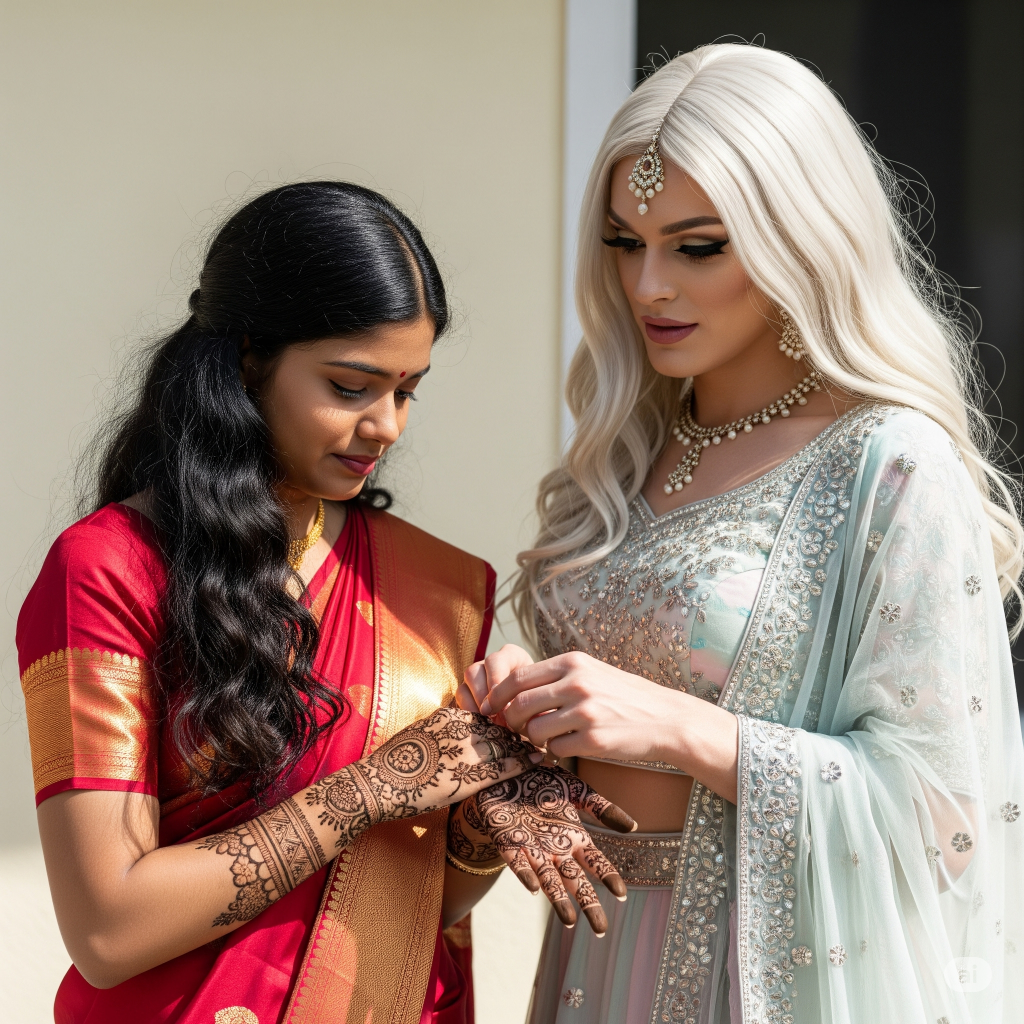
Their guests included friends, queer activists, MIT classmates, and two of Rhea’s cousins who had flown in from Chennai without telling their parents. They cried when they saw her, and hugged Rowena like a sister-in-law.
Before the ceremony, Amma took Rhea aside.
She pulled out the mangalsutra—black beads and gold, delicate but unmistakable.
“This was mine. Now it’s yours.”
Rhea looked at her, eyes brimming.
“I’ll take care of her,” Amma said simply. “As long as you do too.”
“I promise,” Rhea whispered.
Chapter 16 – The Vows
They stood before the priest—an elderly gay Tamil man who had translated the mantras into English and Sanskrit for the sake of clarity and defiance.
They lit the fire together.
They took the seven steps hand in hand.
Then they turned to each other for vows.
Rowena went first.
“You did not choose this journey. But you walked it anyway. You transformed tragedy into grace. I fell in love with your courage. I stay in love with your gentleness. You made me realize that my transition wasn’t just about body, but soul. You’re not the mistake. You are the miracle.”
Rhea could barely speak through her tears.
“I didn’t know how to live after they took my body from me. But then you gave it back to me. Not by changing it, but by loving it. I am not what they made. I am what I chose. And I choose you.”
The crowd sniffled.
Even Amma wiped her eyes behind her glasses.
They sealed their vows not with a kiss, but with pressed foreheads, whispering names only the other would understand.
Then they kissed anyway.
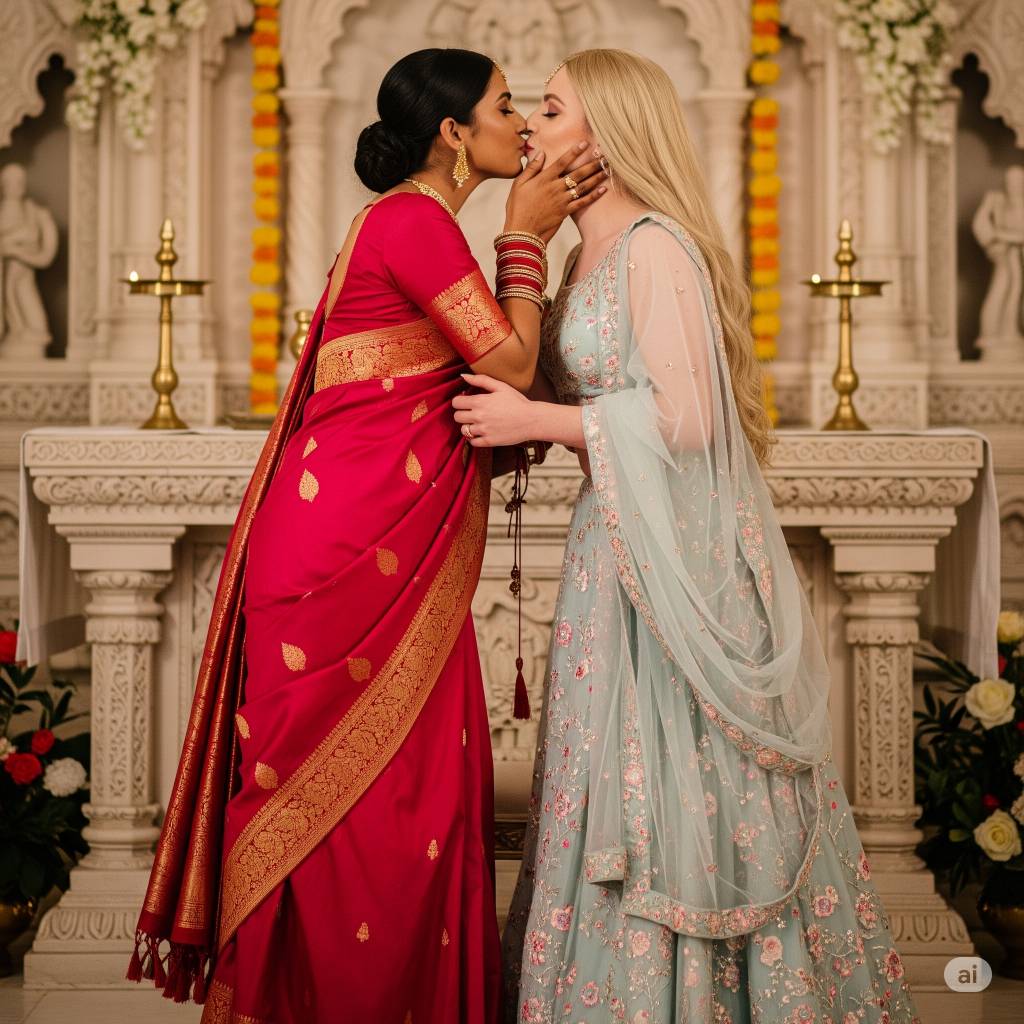
To hell with tradition.
Chapter 17 – Rhea Rising
A year passed.
Rhea Mehta was now the founder of the Consent Care Alliance, a nonprofit that trained hospitals on medical consent, gender trauma, and inclusive practices. She lectured at MIT, not on mechanical systems anymore, but on human ones—on ethics, on systems failure, on how design begins with dignity.
Her wedding photo—sindoor in her hair, gold bangles stacked on her wrists—sat beside a photo of her as Rohan, standing proudly next to a robot chassis. Both versions of her smiled. Both were her.
One morning, Rowena brought her tea as sunlight spilled over their apartment.
“You know what day it is?” Rowena teased.
“Hmm?”
“Your one-year rebirth.”
Rhea raised an eyebrow. “You mean, the anniversary of my accidental womanhood?”
Rowena leaned down. “No, my love. The day you stopped surviving and started becoming.”
Rhea smiled.
She stood, walked to the mirror.
She no longer flinched.
She saw the diamond in her nose. The rise of her breasts. The softness of her jaw. The fire in her eyes.
She touched the mangalsutra at her throat.

And for the first time, there was no grief. Only breath. And morning light.
Epilogue – Red Threads
At the temple in Queens, a priest tied red threads around both their wrists again.
“Protection,” he said. “For this life and the next.”
As they walked out into the city street—hand in hand, bangles clinking, laughter rising—no one could tell who had begun as who.
Only that they had arrived.
Together.
